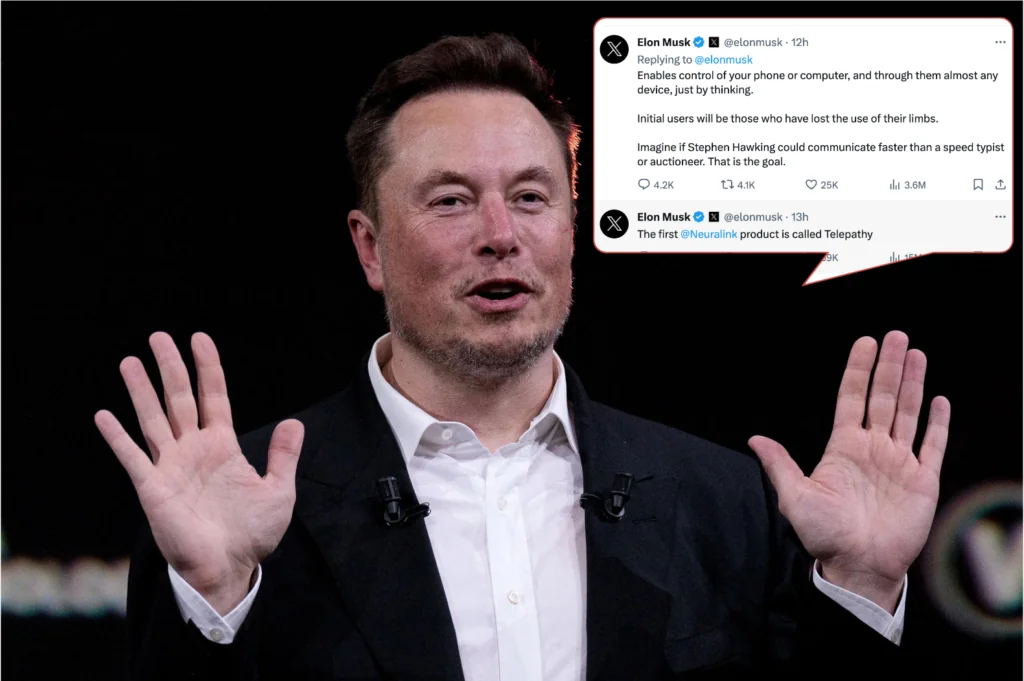Elon Musk, the tech billionaire and visionary behind Neuralink, has made a significant stride in modern neurotechnology. According to a recent announcement on X (formerly Twitter), Musk claimed that his company Neuralink has successfully implanted a wireless brain chip in a human, marking a notable achievement in the field.

✅ AI Essay Writer ✅ AI Detector ✅ Plagchecker ✅ Paraphraser
✅ Summarizer ✅ Citation Generator
“Promising brain activity has been detected after the procedure, and the patient is recovering well,”
Musk stated, highlighting the potential of this technology in addressing complex neurological conditions. This development, as reported by BBC News, places Neuralink among a select group of companies that have ventured into similar technological advancements. Professor Anne Vanhoestenberghe of King’s College London notes,
“For any company producing medical devices, the first test in humans is a significant milestone.”
She acknowledges Neuralink’s achievement but also cautions that “true success” can only be evaluated in the long term, given the nature of this groundbreaking technology.
Musk’s Neuralink is not alone in this endeavor. Other notable players in the field include the École Polytechnique Fédérale in Lausanne, which has made strides in enabling a paralyzed man to walk through brain and spine implants. Their achievements, documented in the journal Nature in May 2023, showcase the rapid progress in brain-computer interface technology.
Animal Testing Controversy
However, the road to this point hasn’t been without controversy. Reuters reported in December 2022 that Neuralink’s animal testing resulted in the deaths of about 1,500 animals. Despite this, the US Department of Agriculture found no violations of animal research rules in a July 2023 investigation, although a separate probe is ongoing. In May 2023, Neuralink received FDA approval to test its chip on humans, embarking on a six-year study involving the implantation of 64 flexible threads into the brain.
The promise of Neuralink’s technology is vast, with Professor Tara Spires-Jones, president of the British Neuroscience Association, stating,
“[It] has great potential to help people with neurological disorders in future.”
Musk further envisions the first product, Telepathy, enabling users to control devices through thought alone. He speculates about possibilities like faster communication for people with motor neurone diseases, drawing inspiration from the late Stephen Hawking.

While Musk’s Neuralink is a relative newcomer, its competitors like Blackrock Neurotech and Precision Neuroscience have been in the field for much longer, each contributing uniquely to the evolution of brain-computer interfaces. These existing devices have already shown promising results in various scientific studies, demonstrating the ability to decode brain activity for communication.
Neuralink’s latest achievement, while still in its nascent stages, opens doors to unprecedented possibilities in neurotechnology and human-computer interaction. As the industry continues to grow and evolve, the implications of such technologies on human health and capabilities remain a fascinating subject of exploration and ethical debate.
Talking about Beuralink’s Breakthrough in the Classroom
So, Elon Musk has done it again, venturing where only sci-fi writers dared to go before! With his latest brainwave (pun intended), Neuralink’s brain chip implant, we’re not just talking about a small step for a man, but a giant leap for mankind – and possibly a hop into some ethical quagmires.
How about we dive into the ethical jungle of brain-computer interfaces? Or maybe get our neurons firing over the future potential and pitfalls of neurotech? From AI buddies to privacy puzzles, and even the sci-fi-esque idea of telepathy becoming real, these topics are not just food for thought – they’re a full-blown intellectual feast! So, grab your thinking caps (or brain chips, if you’re feeling futuristic) and let’s explore these mind-bending questions together.
| Discussion Topics | Essay Topics |
|---|---|
| Ethical Implications of Brain-Computer Interfaces | Analyzing the Pros and Cons of Neuralink’s Brain Chips |
| The Future of Neurotechnology: Potential and Pitfalls | The Evolution of Neurotechnology: From Concept to Reality |
| Elon Musk’s Impact on Technological Innovation | Elon Musk as a Pioneer in Neurotechnological Advancements |
| The Role of AI in Enhancing Neurotechnological Devices | Artificial Intelligence in Neurotechnology: Boon or Bane? |
| Privacy Concerns in the Era of Brain-Computer Interfaces | Addressing Data Security in Brain-Computer Interface Technology |
| The Science Behind Neuralink: Understanding Brain Chips | Technical Breakdown of How Neuralink’s Brain Chips Work |
| Comparing Neuralink with Other Neurotechnology Companies | Neuralink vs. Competitors: A Comparative Study |
| The Potential of Neurotechnology in Treating Neurological Disorders | Neurotechnology as a Solution for Paralysis and Other Disabilities |
| The Societal Impact of Advanced Neurotechnologies | How Neurotechnology Could Reshape Human Interaction |
| Regulatory Challenges in the Development of Brain-Computer Interfaces | Navigating the Legal Landscape of Neurotechnology Innovations |
Follow us on Reddit for more insights and updates.





Comments (0)
Welcome to A*Help comments!
We’re all about debate and discussion at A*Help.
We value the diverse opinions of users, so you may find points of view that you don’t agree with. And that’s cool. However, there are certain things we’re not OK with: attempts to manipulate our data in any way, for example, or the posting of discriminative, offensive, hateful, or disparaging material.